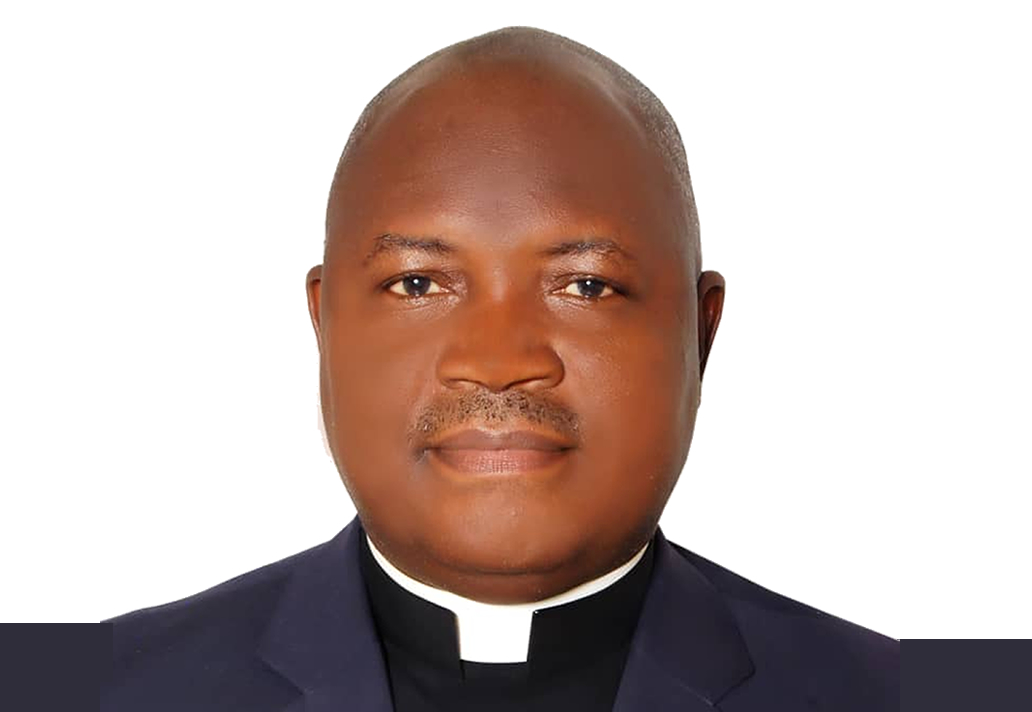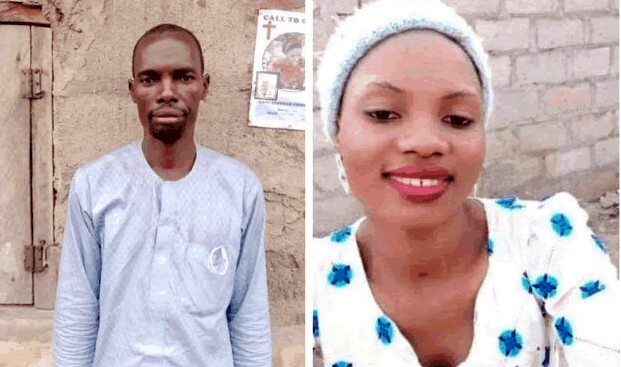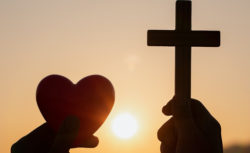In the wake of the killing of Deborah Emmanuel by the enemies of Jesus in Sokoto, Nigeria, Father Nuhu Iliya was thrown into the mix as the chairman of the Christian Association of Nigeria, Sokoto State. He is not a stranger to religious crises. A native of Malumfashi in Katsina state, his family, is the only Christian family in the town. In this interview with Bola Adewara, Father Nuhu (Noah) Iliya (Elijah) says…
… the incessant killings of Christians in the North were caused more by the politicians than the Islamic clerics
… my mother has refused to leave our hometown because she feels very safe with them
… Evangelism and missions are not safe in many parts of Northern Nigeria
… despite the crisis and killings in northern Nigeria, I cannot leave this place. I can’t abandon my people
In an environment so hostile to Christianity, how were you called into the ministry of our Lord Jesus Christ? Where are you from exactly?
I see it as a miracle because I grow up in a community that is predominantly Muslim. I’m from Malumfashi in Katsina state. My father and three of his siblings were the only Christians in that community, a community of many families. We had a priest coming around that time whose lifestyle impacted me. To a considerable extent, he played a prominent role in my understanding of the call God has for me. My mother, also from a Muslim background, was the only Christian in her family. All her siblings, the elder ones, are Muslims. So, from both sides, I didn’t come from a complete Christian background, but God did it for me.
Your family was the only Christian family in that area. Were you people not afraid of persecution? Is it not comfortable to be a Christian around these places?
Persecution has dramatically changed things. In the 1980s, being a Christian in northern Nigeria wasn’t the case as we have it today. There was excellent religious tolerance then. We didn’t have this kind of violent attack or persecution as we have it now. Yes, there was some segregation in place. If there were any celebrations, they would distinguish and try to segregate that we are not Muslims. But there was no such violence as we have it today. People are much more tolerant.
When I was in Primary School, I was the only Christian in my School and my State, yet, I had a CRK teacher. My CRK teacher in my primary School just died last year. I’m talking about around forty-something years because I was in primary School. We didn’t have that kind of violence. The situation had significantly changed and not for good as such. We all celebrate together during the celebration of Christmas, Easter, New Year, or Salah by the Muslims. The only thing that distinguished us was that everybody got his place of worship. We didn’t have this pronounced situation as we have it now.
At what point in Nigeria’s history would you say this violence against Christians began and what were the direct and remote causes of this?
Extremism in religion and the rise of extreme views of religious leaders brought about this persecution. When I talk about religious leaders, I’m talking about leaders from other religions who decided to start preaching radical religion of faith, which brought up that situation.
I also know that religious leaders are not the only people to be blamed for this. The political leaders are even guiltier because they started using religion to gain votes. They used religion to gain votes, and after gaining them, they abandoned the people. To a considerable extent, these two things caused it: religious fanaticism, which has created a lot of followership and the quest by politicians to gain votes.
You are in the Catholic Church today. Tell us about the Churches in your area when you started…
I have been a Catholic all my life, but I also know that other churches like the ECWA came into our area much earlier than Catholics. They had already made a lot of converts and had so many Churches. But I was born Catholic because my father was a Catholic before I was born.
How did you decide to become a Catholic priest, knowing the implications like not getting married and not having your biological children? What was your parents’ attitude to the news?
My father is late. He died in 2013, while my mother is still alive. The tremendous encouragement I got was from the two of them. I’m the firstborn of ten, though some are late now. My people gave me all the needed encouragement to become a priest. From other people, like my siblings, cousins, uncles and aunts, some of them couldn’t understand where I was going, but they couldn’t stop me because they had limited authority over me.
So, sincerely, there was no opposition from my parents or extended family. All they had was a shock, especially those of the Muslim families. It was more like a shock, not opposition as such because they knew they couldn’t do anything.
I remember one of my cousins told me this story. When I was young, I used to be very handsome, and there was this Uncle of mine that I used to visit. He said a woman in the compound would always steer at me and come into the house to look at me. One day, my cousin said my Uncle asked her why is it that you always come in to look at him anytime this boy comes. And the lady said, “But this fine boy, why did he say he would not marry? He wants to become a priest? My Uncle would say when next he comes, you are free to ask him why he said he would not marry. He has chosen not to marry. No one told him not to marry. So, I had no opposition from no one
With the current killings in Northern Nigeria, what is your relationship with your Muslim family today? Are you not afraid of them?
My relationship with my Muslim family is still ok. This is a situation where when you cannot change things, you accept them the way they are.
If I go home today, many of my family members from the extended family are Muslim. We go to them, if there is anything that makes them happy, we rejoice with them. If there is anything that makes them sad, we also identify with them.
However, we know that once the fire of religious bigotry and fanaticism starts, anybody can be a victim. In 2021, we suffered that. Although they didn’t burn our house, they burnt our Church in my village. So, it’s like we have become part and parcel of them. If you come to my town, the only Christian family is my family. I’m talking about a place where you can count over 300 families, and we are the only Christian family. We have become one!
Being the only Christian family in such a large community, are you not afraid?
That is the mystery. When I lost my father in 2013, my bishop visited my mother. Seeing where we stayed, he asked me, ‘when are you relocating your mother from this place’. I said I don’t know when but I have started a process. When I told my mother about relocating her to a place where we have a more significant number of Christians, she said no, she was not going anywhere. Her husband lived, died and was buried here. So, where is she going to? She discouraged us from moving her out of the place. Today, my younger ones who are married are still there and safe. Some of my friends who visit that place still ask me how we survive there. Everyone keeps asking, and I say I don’t know, but we are here. God has a purpose for creating us and keeping us there.
Despite all this crisis, we feel much more secure here because they are our brothers, sisters, and cousins. Why should we allow religion to divide us? It will be difficult for them to destroy us unless a religious war is declared. Despite all these religious crises, we feel very comfortable with them.
You were raised in Katsina. How did you find yourself in Sokoto?
The system run by the Catholic Church is called Diocese, which means a Church territory with a bishop taking charge, and this Diocese is not based on State but on areas the Church covers. I was a priest under Sokoto Diocese and a priest for the Diocese, and that is why we are called Diocesan priests. My work is limited to the Diocese of Sokoto unless there is an agreement between my bishop and another bishop in any part of this country, Africa, or anywhere. I can be asked to go and work there. But my work there is for some time. As the agreement stipulates, I have to return to my Diocese after one, two, or three years. I have not worked as a priest elsewhere in this country, but I’ve been to another part of this country.
Father, given this persecution in the North, if you have a choice, would you leave the North? Will you leave Sokoto?
The choice has always been there, but it is not easy to even choose. I feel so attached to this place. I can’t leave my people. Where ever I travel to, this is me. Others may have a different kind of opinion, but the thing is that even if I have a choice, I will still choose to remain here.
Between 2007 to 2009, I was in the United States. In 2009, the Boko Haram issue started, and it coincided with my return to Nigeria. One of the ladies asked me if I was going back to Nigeria. I said yes. She said with what is happening in Nigeria? I said yes, that is where I have my parents, younger ones, brother and sisters and others. So, I’m going back to Nigeria. They were looking at me as if I came from the moon. So, I came back.
I prefer a peaceful North because I have been called, ordained and commissioned here. It would amount to a betrayal of the people if I abandoned them. So, if I have an option, I will still choose where I am, I can assure you.
You just narrated how tolerant and innocent Northern Nigeria was before extremism started. Do you think this same North can ever be peaceful, tolerant and innocent again?
The answer is yes and no. Yes, in the sense that if we have a very selfless, committed, sincere leadership, it is possible. To a large extent, I attribute what we had then to the leaders we had at that time. Personally, I don’t blame the religious leaders as much as I blame the political leadership because the religious leader can’t effect arrest or persecution, so there is an extent they can go.
I know they can influence and incite people, but if we have an outstanding leadership devoid of religious and ethnic sentiments and people who are truly patriotic, I’m sure we can go back to such innocence. Remember the election of Yar’adua. Though a Muslim from the North, he did well within the time he stayed in that office. Same with Shehu Shagari. We had people from Southern Nigeria like Olusegun Obasanjo, who was able to confront the monster in his time.
On the pessimistic side, I said no because these politicians are working harder and anything that brings vote, good or bad, is what they will run after.
Recently, a senator was campaigning, and he said, well, we know that this government didn’t do what you expect, has not done much, but it is still our people. So, let us vote for them. With that kind of statement, you don’t expect anything different.
Is Evangelism and mission safe in Northern Nigeria? Would you encourage missionaries from the south or outside Nigeria to come to northern Nigeria?
Indeed, with the reality on the ground, it is not safe. Certain places are not safe, not everywhere. For example, here in Sokoto, there are certain local government areas where we have not been going because we have been cautioned against going to such places. We know that sometimes in Evangelism, we will meet a lot of angelic assistance, but I don’t think it is proper when you know that the danger is already there and you have a warning base on security reports that going to such places could be dangerous.
When you get to a strange land on missions, you need to know who they are, their religion, culture, temperaments, etc. It will be difficult for foreign evangelists or organisers to come around. It is better for us who are already on the ground, who know the terrain, to go on with that. Not complete strangers. However, the work is not our own. He who calls will always protect.
Recently, somebody came from Lagos and said she had a vision that she should go to a place called Raba to preach. She told me about the vision, but I told her what I had been told, face to face, based on the reality on the ground. “Madam, those of us who have members are not going there because we have been told not to. But if you say God told you to go, I cannot argue with what God has said. But I’m telling you what we know if you listen to me. I am the CAN chairman in this State, and I know those places that are not safe for anybody with the message of the gospel to go in for now. I don’t know whether she went or not. I didn’t see her again.
Given the incessant killings of Christians in the North, do church leaders teach our Christian siblings how to relate to these extremists?
This is an ongoing process. We, the Christian leaders in the North, do try our best at all times, even before this Deborah episode. We have had this kind of incident in some other places, and we can draw a lesson from there that there is a need for mutual respect as we live with other people of different religions. We don’t need to denounce them or do things that will generate tension, controversy or even crisis. We always tell them this is. The work of a preacher is to speak what he has been called to say. And we have never failed in that part.
The response of many Christians to the killing of Deborah is that of curses, anger and calls for prosecution. The reaction of Stephen and Jesus to their killings was that of forgiveness. In the situation we find ourselves in today, how should a Christian respond to the killing of Deborah?
We are all sad, but as long as we remain Christians, while we express our sadness, we also remember what our faith teaches. Forgiveness of our enemy. It is a divine command. That makes us different. We are sad and angry, but we can’t say because of these, we will not obey Jesus. We will only pray that such a thing will never happen again or become a culture.









